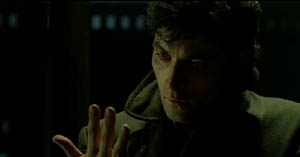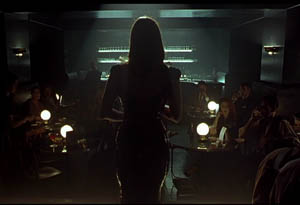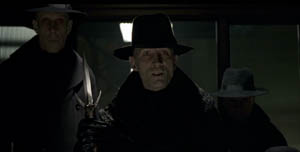|
One might observe that generally speaking, studios should probably listen to directors more often. Whenever a creative disagreement ensues, it's almost always the studio that has the bonehead ideas about dumbing the product down-indeed, on the new DVD commentary, director Alex Proyas indicates that a studio exec told him to do exactly that, in those words, after test screenings had been iffy. If that doesn't turn your gut with disgust, I can only conclude that it's because you're either a home-school dropout in need of rampant dumbing-down from your media, or a studio exec, two groups who need to stop going to the movies for the benefit of the rest of us. 
This is a film I've always had issues with, one which seemed to flirt with greatness but never quite got it into bed. If you've never seen the film before, start with this version. If you haven't read my review of the original version, which is fairly likely, then don't. One of the biggest flaws with the theatrical cut was the narration which was added at the studio's behest (apparently, Blade Runner wasn't a big enough object lesson in this department for some people, who continue to insist on making the same old mistakes, again and again, chickenshit conformists like their parents), which revealed numerous crucial plot points within the first twenty seconds of the story, leaving the viewer no chance to enjoy the mystery first. Getting rid of it is a huge structural improvement. A few of the clunkier effect shots were also tweaked, and more character work appears in this version, as well. While he was at it, the director could've taken a moment to shear out a rather silly summation given by the main character wherein he basically ascribes human nature to some mystical "soul" or such nonsense, but since, unlike believers in such things, I don't expect miracles, I can't say I really thought I'd get that lucky. John Murdoch awakens in a bathtub, finds a dead woman and a murder weapon in the hotel room with him, and discovers he has no memory of committing such an act, or of anything else, for that matter. A phone call informs him that his memory loss is the result of an experiment gone wrong, and that men are coming for him. John doesn't know what's happening to him, and thankfully, in this version, neither do we. From this point on, we follow the character, learning things as he learns them, trying to make sense of a world that defies it. Pale men in long black coats prowl the city while everyone else inexplicably falls asleep-everybody but John. The city seems to be a living thing, growing and changing while the denizens sleep. And no matter how long John wanders in search of clues, he never sees the sun come up. Compared to all of this, the notion that he might be a killer of prostitutes seems the most easily digestible notion he has to deal with.  The paramount theme in the film is the role of memory in our lives. Memory is, after all, a very slippery thing. We like to think that our memories are accurate representations of past events in our lives, but science knows otherwise. Memories are frequently confabulations, exaggerations, simplifications, or outright inventions. For a topical example, one need look no further than Roger Ebert's review of the film. Ebert, one of Dark City's earliest and most vocal cheerleaders, has gone so far as to analyze the film one shot at a time at film festivals, and yet claims that in the film, the character of Emma, played by Jennifer Connelly, believes she first met her husband, John Murdoch, at a place called Shell Beach. The film itself unequivocally says otherwise. His commentary on the first edition of the DVD also referred to the location as "Seal Beach" on multiple occasions (all of which were deleted for the revised commentary on the new edition). Of course, I assert this based on the assumption that my memories of the film are correct. I stand by that assertion, but that's sort of the point. In such situations, everyone will assume the accuracy of their own memories and dismiss discrepancies as the fault of others. Of course, half of those people must be the others. Without external, corroborating evidence, we are at the mercy of our own minds' accounting of events. If those accounts are wrong, perhaps very wrong, how could we know, and what effect would it have on our identities? If one remembers being a murderer, will he continue to murder in the same manner? The black-garbed men want to know. John wants to know what the black-garbed men have done to him. He watches from the shadows as the men steal out of hiding at the stroke of midnight, accompanied by a nervous, stammering doctor who performs injections into people's heads as their surroundings transform in bizarre and spectacular ways. No one else seems any the wiser. Though he seems to be a collaborator, the doctor seems excited and hopeful at Murdoch's gradual awakening. Amongst other things, Murdoch gradually becomes aware that he is not exactly normal; perhaps he is the key to taking the city back from the trenchcoated strangers, who live beneath the streets and seem to control all. Unfortunately, the last man to awaken during the city's nightly rebirth, the former parter of the detective assigned to capture Murdoch for suspected murder, went barking mad due to what he found out. The doctor, too, seems to harbor secrets he is loathe to disclose or confront. 
Dark City, even in this far improved cut, still promises slightly more than it can ultimately deliver. The final confrontation is both wildly contrary to the slow, moody presentation of all that came before, and is lacking the visual imagination we've come to expect by the time we reach the end. The biggest flaw, however, is in the story's psychological underpinnings, which never fully find purchase. The doctor asks at one point whether or not we are defined as the sum of our memories. If so, then what is a man who has none? Amnesiacs, after all, generally retain their personalities in spite of not remembering the events that shaped them. But rather than leaving the question open-ended for audiences to ponder, as in Blade Runner, the film simply assumes the result of the experiment without (obviously) having conducted it to see, and that's bad science. Yes, I know, it's not science at all, it's a movie, but it's a weakness in an otherwise strong and inventive narrative. The author would rather offer a comforting answer than deal with existential vagaries, but the fact is that the notion of a human "soul" isn't, in any sense, an answer to anything; rather, it presents even more questions. Memento managed to accurately portray issues of memory and identity without retreating into metaphysical musings, and was better for it. This film is undercut by the fact that its weakest material comes at the end, including overuse of the "Aquaman effect" (if you've seen it, you know what I'm talking about). But with this retooled version, there's enough intrigue and style to generally compensate for that lack. It may not be perfect, but it's definitely closer. -review by Matt Murray
|
|
||||||||